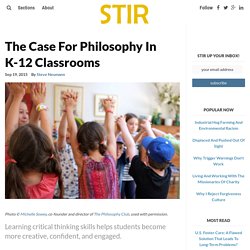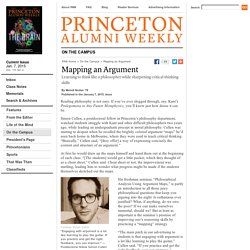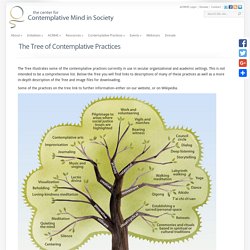

The Case For Philosophy In K-12 Classrooms – STIR Journal. Learning critical thinking skills helps students become more creative, confident, and engaged. ast year I wrote an opinion piece for the New York Times in which I argued that academic philosophers should do more to make philosophy accessible to the general public.

I had come to believe that the kind of critical thinking inherent in doing philosophy was crucial for the health of a pluralistic society. I also felt I owed a debt to my own philosophical education, which has enabled me to have a more nuanced understanding of my experience in the world, and has given me the tools to craft my own meaning in life. As part of my research for that article, I interviewed Grace Robinson, creator of Thinking Space, an organization that uses philosophical inquiry and dialogue with a diverse array of clients — public schools, universities, charities, businesses, and various community organizations. In an ideal world, K-12 public education should prepare our children for life, work, and citizenship. Alumni Weekly: Mapping an Argument. Reading philosophy is not easy.

If you’ve ever slogged through, say, Kant’s Prolegomena to Any Future Metaphysics, you’ll know just how dense it can be. Simon Cullen, a postdoctoral fellow in Princeton’s philosophy department, watched students struggle with Kant and other difficult philosophers two years ago, while leading an undergraduate precept in moral philosophy. Cullen was starting to despair when he recalled the brightly colored argument “maps” he’d seen back home in Melbourne, where they were used to teach critical thinking.
“Basically,” Cullen said, “[they offer] a way of expressing concisely the content and structure of an argument.” At first he would draw up the maps himself and hand them out at the beginning of each class. Courtesy Simon Cullen “Engaging with argument is a lot like learning to play the guitar. “The main pitch in our advertising to students is that engaging with argument is a lot like learning to play the guitar,” Cullen said. What is Philosophy? An Omnibus of Definitions from Prominent Philosophers. By Maria Popova “Philosophy is 99 per cent about critical reflection on anything you care to be interested in.”
Last week, we explored how some of history’s greatest minds, including Richard Feynman, Carl Sagan, Albert Einstein, Marie Curie, and Isaac Asimov, defined science. Kant famously considered philosophy the “queen of the sciences” — whether or not that is true, philosophy seems even more elusive than science to define. From Philosophy Bites, the book based on the wonderful podcast of the same name, comes an omnibus of definitions, bound by a most fascinating disclaimer — for, as Nigel Warburton keenly observes in the book’s introduction, “philosophy is an unusual subject in that its practitioners don’t agree what it’s about.” The following definitions are excerpted from the first chapter of the book, which asks a number of prominent contemporary philosophers the seemingly simple yet, as we’ll see, awfully messy question, “What is philosophy?”
Another running theme — sensemaking: Philosophy Experiments. Games.
Community. Truth/Education. The Tree of Contemplative Practices. The Tree illustrates some of the contemplative practices currently in use in secular organizational and academic settings.

This is not intended to be a comprehensive list. Below the Tree you will find links to descriptions of many of these practices as well as a more in-depth description of the Tree and image files for downloading. Some of the practices on the tree link to further information–either on our website, or on Wikipedia. © The Center for Contemplative Mind in Society Concept & design by Maia Duerr; illustration by Carrie Bergman Understanding the Tree On the Tree of Contemplative Practices, the roots symbolize the two intentions that are the foundation of all contemplative practices.
The branches represent different groupings of practices. Because this illustration cannot possibly include all contemplative practices, we offer a free download of a blank Tree that you can customize to include your own practices. Downloading and Reprinting the Tree For printing:
Food & Health. Earth. Creativity. Arts. Technology. Science. Mathematics. Brain. Religion & Spirituality. Cosmos. Morgan Harris - George Steiner on the incompleteness of life. Time. Watchmen. Texts.